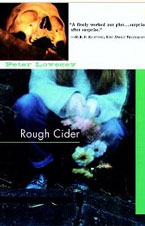Cocktail Talk: Rough Cider
 Peter Lovesey is an English mystery writer, perhaps most famous for his barrel-shaped and brusque Bath detective Peter Diamond and for his Sergeant Cribb books that take place in the Victorian era. I dig both. Lovesey isn’t all flashy, and isn’t perhaps as well-known as he should be over on this side of the pond, but his plots are always incredibly well thought out, his characters are real and motivated, and once you dive into one book featuring one of his two main characters, you tend (or I did, at least) to want to read more. They don’t hit the cocktails as much as other crime solvers of the police-and-non kind, so I haven’t mentioned him much here on the Spiked Punch blog. And, funny enough when considering the above, the quote below comes from the book Rough Cider, which doesn’t contain either of the fictional gentlemen mentioned above. But Rough Cider does has a fine mystery/story, and lots of cider talk (a murder happens at a cider farmer’s, if that makes sense), and I like cider, and so now it all makes sense, right? I did learn a few things from the book, too. First (and this is gross), cider makers at one time would put legs of mutton in the cider to give it a bit of body. Hmm. Second, cider that was bad would be termed “ropy” as in the below quote. Third, never put a human skull in your cider, or it will turn it ropy (unlike if you put mutton in I guess). Did these learnings turn me off cider? Nah. But they have given me a few more things to talk about when drinking it. This quote also features one of my favorite words (hogshead) and talks about drinking from jam jars, which I’m a fan of, even outside of wartime.
Peter Lovesey is an English mystery writer, perhaps most famous for his barrel-shaped and brusque Bath detective Peter Diamond and for his Sergeant Cribb books that take place in the Victorian era. I dig both. Lovesey isn’t all flashy, and isn’t perhaps as well-known as he should be over on this side of the pond, but his plots are always incredibly well thought out, his characters are real and motivated, and once you dive into one book featuring one of his two main characters, you tend (or I did, at least) to want to read more. They don’t hit the cocktails as much as other crime solvers of the police-and-non kind, so I haven’t mentioned him much here on the Spiked Punch blog. And, funny enough when considering the above, the quote below comes from the book Rough Cider, which doesn’t contain either of the fictional gentlemen mentioned above. But Rough Cider does has a fine mystery/story, and lots of cider talk (a murder happens at a cider farmer’s, if that makes sense), and I like cider, and so now it all makes sense, right? I did learn a few things from the book, too. First (and this is gross), cider makers at one time would put legs of mutton in the cider to give it a bit of body. Hmm. Second, cider that was bad would be termed “ropy” as in the below quote. Third, never put a human skull in your cider, or it will turn it ropy (unlike if you put mutton in I guess). Did these learnings turn me off cider? Nah. But they have given me a few more things to talk about when drinking it. This quote also features one of my favorite words (hogshead) and talks about drinking from jam jars, which I’m a fan of, even outside of wartime.
One evening in October, 1944, almost a year after the tragic events I’ve been describing, a man in a public house in Frome, the Shorn Ram, ordered a pint of local cider, a drink strongly preferred in wartime to the watered-down stuff that masqueraded as beer. People didn’t object to drinking from jam jars in those days of crockery shortages, but they were still choosy about what went into the jam jars. So when a customer complained that the cider was “ropy,” it was a serious matter. The publican had just put a new barrel on, a large one, a hogshead, from Lockwood, a reliable cider maker. He drew off a little for himself and sampled it.
—Rough Cider, Peter Lovesey





















